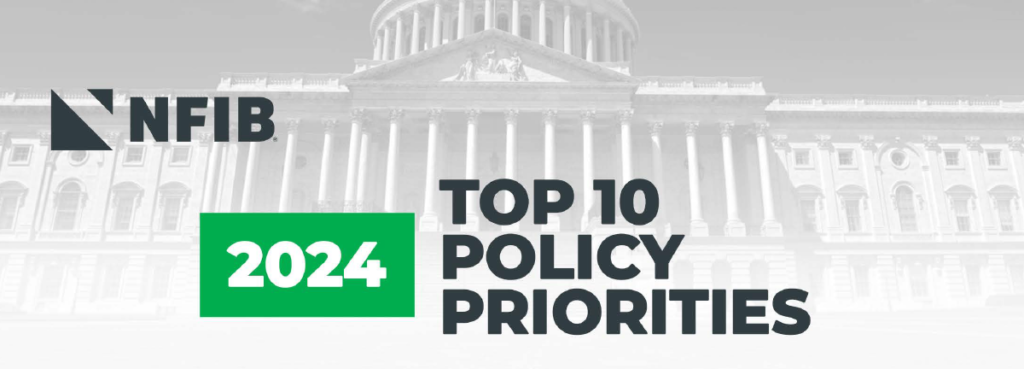NFIB highlights top legislative priorities for this year's Congress
While small businesses continue to grapple with inflation and labor shortages, there are several important policy issues that could help ease the burden elsewhere on Main Street. NFIB continues to monitor the issues that matter most to small business owners and has published its “Top 10 Policy Priorities for 2024''. This list outlines the key legislative issues that will impact small businesses across the country in the coming year, from onerous reporting requirements to harmful tax increases.
“Main Street businesses have faced unprecedented economic headwinds in recent years, from record inflation to historic labor shortages,” said Jeff Brabant, NFIB vice president of federal relations. Ta. “Despite these challenges, small business owners continue to strive to serve their customers, employees, and communities. However, excessive regulatory hurdles, looming tax increases, and ever-rising operational challenges The costs threaten to make it more difficult than ever for small businesses to grow and thrive.”
To help educate legislators about the most pressing issues small business owners face every day, NFIB has compiled a list of top policy priorities for 2024.
NFIB uses this list to educate legislators about the most pressing small business issues, help prioritize advocacy efforts, and call our members to action.
Priority 1: Make the small business deduction permanent
NFIB encourages Congress to pass this bill Main Street Tax Security Act, which makes the 20% small business deduction permanent. If Congress does not act, the small business deduction will expire at the end of 2025, resulting in increased taxes for more than 30 million business owners.
sign the petition
Priority 2: Stop issuing unnecessary and burdensome regulations
The NFIB is increasingly concerned about the burdensome rulemaking coming out of the administration. Small business owners do not have dedicated employees to deal with compliance issues and often handle these issues themselves.
- NFIB opposes proposals to raise the overtime exemption threshold for managers.
- NFIB supports repealing regulations that limit the use of independent contractors by small businesses.
- NFIB supports the repeal of the recently finalized joint employer rule, which would strip franchisees of their autonomy and independence.
- The NFIB opposes proposals that would require small and medium-sized businesses to report their carbon emissions to the publicly traded companies they do business with.
Repeal of joint employer rules
Priority 3: Increase competition in the credit card network market and stop megabanks and credit companies from using anticompetitive practices that harm small businesses.
Swipe fees for small businesses typically run as high as 3-4% of each transaction. These fees are set in an anti-competitive manner by a limited number of large credit card companies. NFIB is credit card competition law That's because it would introduce competition into the credit card network market, causing megabanks and credit card companies to compete on price, just as small business owners do on a daily basis.
Suppression of swipe fees
“Now is the time for Congress to address important issues impacting Main Street and prioritize small business-friendly legislation, including: Main Street Tax Security Act and other policies that strengthen the small business economy,” Brabant said.
See all 10 policy priorities for 2024 and take action to support small businesses on these issues. After signing the petition, encourage your senators and representatives to co-sponsor. Main Street Tax Security Act Make the 20% small business deduction permanent and share personal stories of how this deduction has helped small businesses.
I take action


